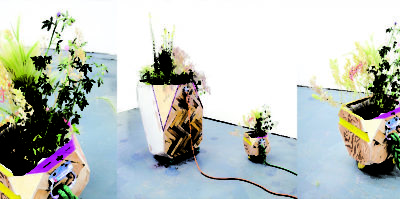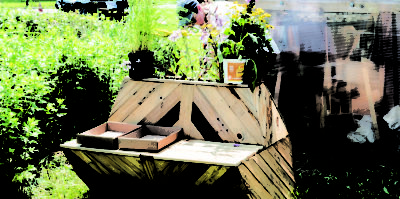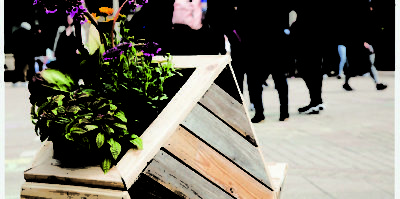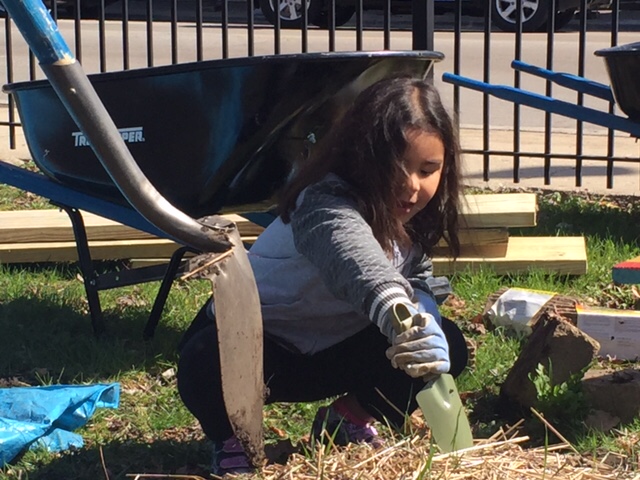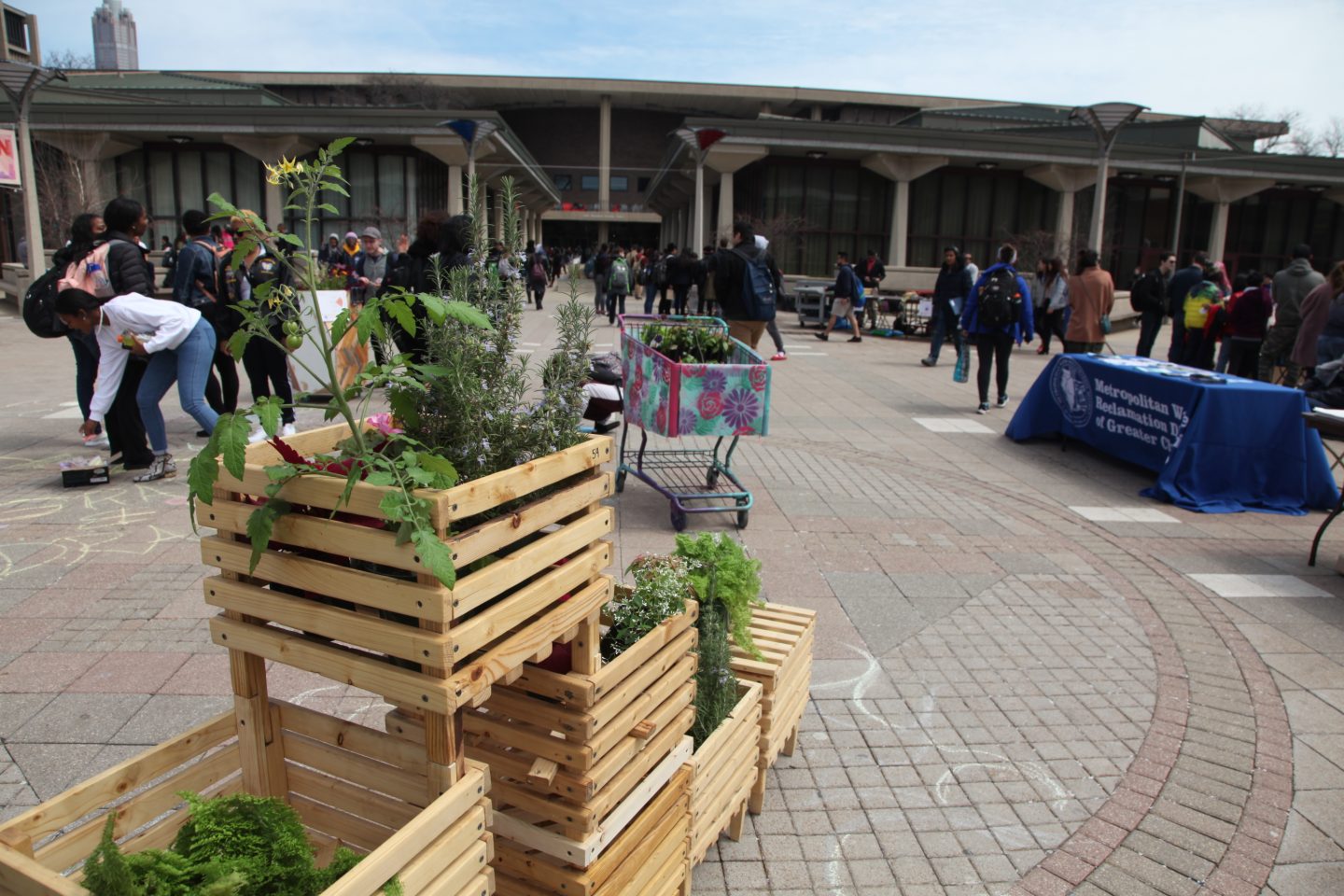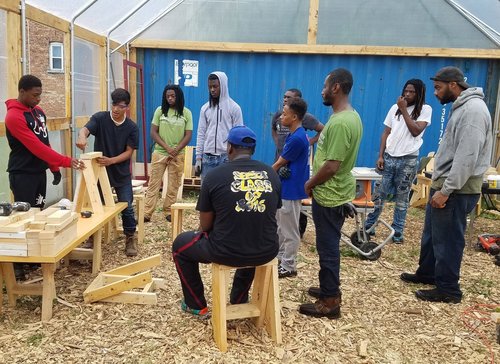Exhibitions
ABOUT THE EXHIBITION
Created by artist Jenny Kendler, Garden for a Changing Climate is a community-driven participatory public art project that uses a traveling garden of local plants to give Chicagoans a dynamic and tangible experience of the central effects of climate change. As our climate warms, seasons and ecozones will shift. The push-able and pull-able, wheeled Garden for a Changing Climate planters demonstrate these changes in accelerated fashion. Through this moving garden, Chicago residents can envision the otherwise largely invisible, slow, and dispersed threat of climate change, and understand how a shifting climate will change our urban environment. Community-based organizations will lead how the Garden project draws participants into an understanding of how these changes will affect them directly.
A recent paper, published in the science journal Nature, suggests that climate zones (and their corresponding ecosystems) are moving at the approximate rate of 3.8 feet every day. The rate will vary widely for different species, but the principle remains the same—that in order to survive the locked-in warming predicted in our future, organisms, including plants, must move towards the poles.
Filled with diverse Midwestern plants and constructed with reclaimed materials, the fleet of planters are the center of community-based activities, walks, and conversations considering the coming climate-related effects on Chicago. Planned in collaboration with Chicago community-based organizations public Garden for a Changing Climate walks and events will take place from April to September 2018 on UIC’s campus and in featured Chicago neighborhoods.
At its heart Garden for a Changing Climate asks participants to consider our relationship to a changing climate and asks: What does climate change mean to the lives we live here in our city? How will the lives of humans, plants, animals, insects, and other species change or be altered? What unexpected opportunities to restructure a more just world may be provided with these changes? What are we hopeful about in re-shaping our futures? Garden for a Changing Climate aims to encourage citizen science and bring new sense-based awareness to the often times imperceptible issue of climate change. Reconnecting our sensitivities with nature’s shifts in time and space can help us understand the new paths being made in this quickly changing world—and give us a compass by which to chart our own way forward, together.
ARTISTS
Jenny Kendler is an interdisciplinary artist, environmental activist, naturalist and wild forager who lives in Chicago and elsewhere. She is currently the first Artist-in-Residence with Natural Resources Defense Council (NRDC), and stewards the non-profit artist residency ACRE, as Vice President of the Board. Kendler’s work has been exhibited nationally and internationally at museums and biennials. She holds a BFA from the Maryland Institute College of Art and an MFA from the School of the Art Institute of Chicago
SUPPORT
This collaborative, community engaged project is funded by the Humanities Without Walls consortium based at the Illinois program for Research in the Humanities at the University of Illinois at Urbana-Champaign. The Humanities Without Walls consortium is funded by a grant from the Andrew W. Mellon Foundation. Partners in producing the project are artist Jenny Kendler, curator; Lorelei Stewart, Director, Gallery 400; art historian and educator Hannah Higgins at UIC; education researcher and science educator Noah Weeth-Feinstein at UW-Madison; PhD and Masters students; scientists; and community activists.
All Gallery exhibitions are supported by the UIC School of Art & Art History; the UIC College of Architecture, Design, and the Arts; the University of Illinois at Chicago, and a grant from the Illinois Arts Council, a state agency.
PRESENTING PARTNERS
Sweet Water Foundation
Sweet Water Foundation practices Regenerative Neighborhood Development, a creative and regenerative social justice method, that creates safe and inspiring spaces and curates healthy, intergenerational communities that transform the ecology of so-called ”blighted” neighborhoods.
Marshall Square Garden Appreciation Tour
Little Village’s Marshall Square is home to many community gardens that bring neighbours together in green spaces where they cultivate plants, share food, and their personal narratives. The Marshall Square Garden Appreciation Tour is a travelling event that celebrates two of the many garden hubs in Marshall Square, Esperanza Health Center and Telpochcalli School’s garden and the garden at Hammond Elementary.
American Indian Center
Since our inception, American Indian Center (AIC) has adhered to its founders’ mission:
“To promote fellowship among Indian people of all Tribes living in metropolitan Chicago and to create bonds of understanding and communication between Indians and non-Indians in this city. To advance the general welfare of American Indians into the metropolitan community life; to foster the economic advancement of Indian people, to sustain cultural, artistic, and avocational pursuits; and to perpetuate Indian cultural values.”
360 Nation
360 Nation is a community organization based out of the West Side of Chicago that utilizes relationship building, gifts, and talents to promote self-determination in the Black community.


